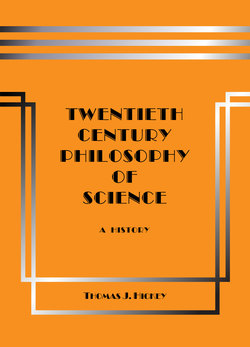Читать книгу Twentieth-Century Philosophy of Science: A History (Third Edition) - Thomas J. Hickey - Страница 112
На сайте Литреса книга снята с продажи.
Scientific Criticism
ОглавлениеIn the Analysis of Sensations Mach states that he has taken Hume as his starting point, and this starting point is reflected in his views on scientific criticism. The scientist like everyone else knows the elements with complete certainty as sensations. But scientists and other persons also make judgments that are laws or generalizations. Since the aim of science is the adaptation of thoughts to facts, a new fact may require a new adaptation, which finds its expression in the operation of judgment. A judgment is the supplementing of a sensational presentation, in order to represent more completely a sensational fact. In the adaptation of thoughts to facts the adaptation can be made only to what is constant in the facts. Only the mental construction of constant elements can yield economy. But our confidence in the constancy in our judgments or generalizations rests entirely on the supposition, which in a given case has been substantiated by numerous trials, that our mental adaptation is sufficient. And we must be prepared to find this supposition contradicted at any moment.
Therefore empirical laws as well as theories are provisional in Mach’s view, but for different reasons. The empirical generalizations are provisional, because they impute constancies to an infinite number of individual occurrences of sensations while only a limited number have actually been experienced. On the other hand theories postulate things that have never been experienced; no one for example has ever (in Mach’s time) actually seen atoms or molecules nor has anyone ever experienced Newtonian absolute space or absolute time. Mach did not seem to find the provisional status of empirical laws to be very disturbing and in fact he considered laws to be necessary for science to have its economy. But he considered the provisional status of theories to be an unsatisfactory expediency for science. His philosophy of scientific criticism includes a phenomenalist criterion that rejects theories. Initially the logical positivists who followed Mach were reluctant to accept Hume’s skeptical views on scientific criticism, and instead accepted the idea of “verification”, the view that scientific laws or empirical generalizations can be established in some permanent sense, an idea that historically had been definitive of truly scientific knowledge. But Carnap and the logical positivists moved toward Mach’s acceptance of scientific laws as provisionally true instead of permanently true, even as they moved away from his phenomenalism.
